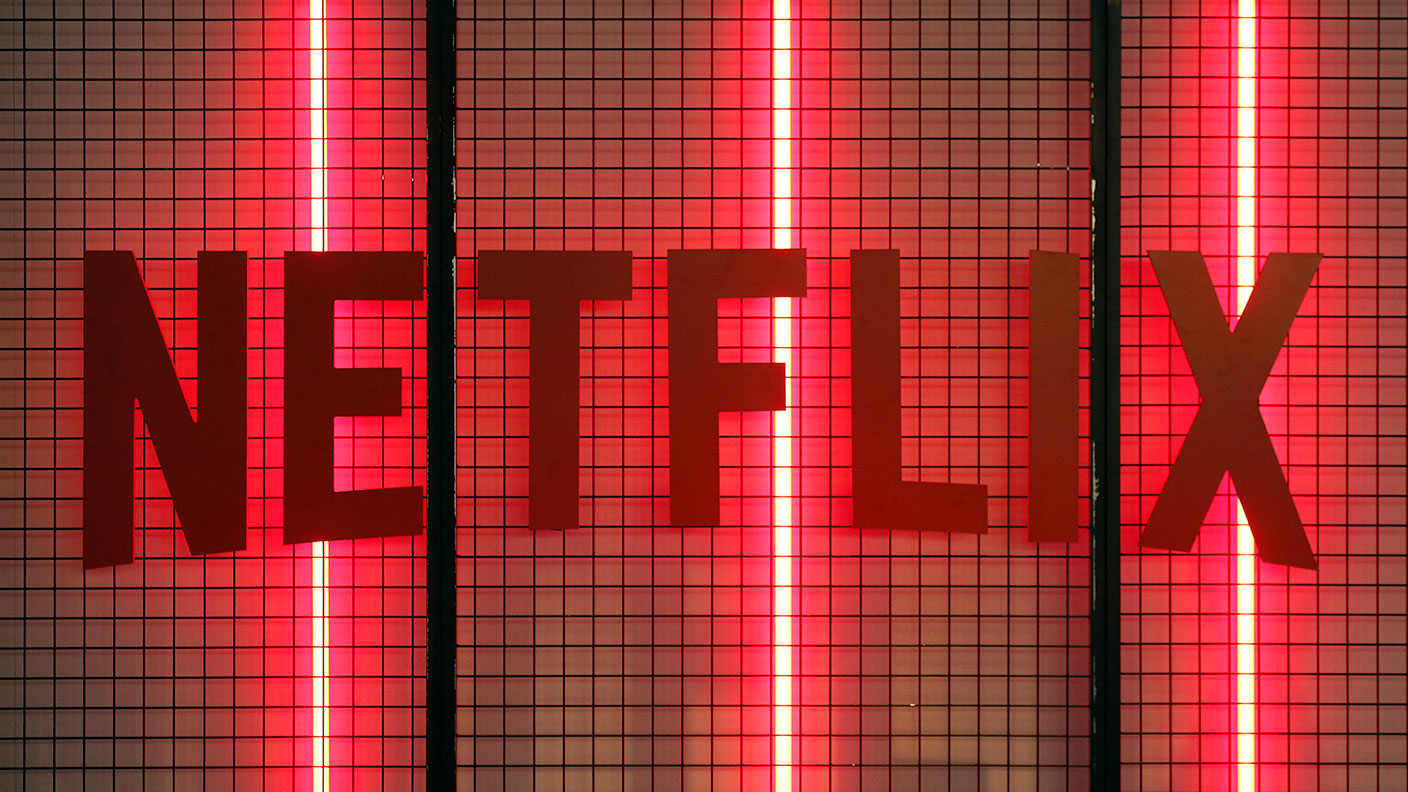Netflix’s share price has fallen by two thirds from its peak – is it time to buy?
Video streaming giant Netflix has been losing subscribers – driving its share price to its lowest in six months. So, asks Rupert Hargreaves, should you buy Netflix shares?


Get the latest financial news, insights and expert analysis from our award-winning MoneyWeek team, to help you understand what really matters when it comes to your finances.
You are now subscribed
Your newsletter sign-up was successful
Want to add more newsletters?

Twice daily
MoneyWeek
Get the latest financial news, insights and expert analysis from our award-winning MoneyWeek team, to help you understand what really matters when it comes to your finances.

Four times a week
Look After My Bills
Sign up to our free money-saving newsletter, filled with the latest news and expert advice to help you find the best tips and deals for managing your bills. Start saving today!
It’s becoming harder for streaming companies to grow as the race for eyeballs enters a new phase. After a decade of breakneck growth, Netflix (Nasdaq: NFLX), the poster child of the streaming boom, lost 200,000 subscribers in the first quarter, and is warning that it could lose a further two million in the second quarter as “revenue growth headwinds” weigh on growth plans. For comparison, it added 37 million subscribers in 2020.
Of course what the company means by “revenue growth headwinds” is that it’s facing more and more competition from the likes of Disney (NYSE: DIS), Amazon (Nasdaq: AMZN) and Warner Bros Discovery (Nasdaq: WBD), not to mention the plethora of other online streaming and video sites that have emerged over the past few years. Consumers are also starting to tighten their belts as the cost of living rises.
Consumers are starting to walk away from costly subscription packages
According to analytics group Kantar, UK consumers walked away from about 1.5 million video on-demand accounts during the first three months of 2022, a strong sign of the pressures Netflix and its peers are facing.
MoneyWeek
Subscribe to MoneyWeek today and get your first six magazine issues absolutely FREE

Sign up to Money Morning
Don't miss the latest investment and personal finances news, market analysis, plus money-saving tips with our free twice-daily newsletter
Don't miss the latest investment and personal finances news, market analysis, plus money-saving tips with our free twice-daily newsletter
It’s also worth noting that, despite today’s news, Netflix, alongside Amazon’s Prime Video, actually has the lowest subscriber churn rates of any streaming services, suggesting that others are facing far higher cancellation rates.
With around 222 million subscribers, Netflix remains the world’s largest streaming service (Amazon comes a close second with 200 million Prime subscribers), but its size does not mean it is immune from the pressures facing the rest of the industry.
With content and market costs rising, the group is tapping its customers for extra cash, and this isn’t going down too well. Netflix recently increased its monthly price in the UK by an inflation-busting 10% (from £10 to £11) and in the US by 11% (from $14 to $15.50).
Price hikes in the US and Canada cost the company 600,000 subscribers, although the decision was still “revenue positive” for the business. Withdrawing from Russia after its invasion of Ukraine cost another 700,000 paying users (excluding this loss, the group actually added 500,000 subscribers in the first quarter, although this was still far below Wall Street expectations).
Spending on content spending has jumped as streamers compete for users
Netflix has long been criticised for its “growth at any cost” content strategy, which has put enormous pressure on its balance sheet, but it is not alone. Analysts estimate the firm will spend around $20bn on content this year, nearly double the $10bn it spent in 2020.
But this is just a fraction of the $230bn that will be spent on subscription video on demand (SVOD) content globally in 2022.
These numbers illustrate the scale of the challenges facing both the company and the wider sector. It needs to keep spending on content to keep its head above water, but to fund this spending it needs more money from subscribers – and some subscribers are clearly not willing to pay up.
That said, the company’s financial position is stronger today than it has been for years. It generated $800m in free cash flow in the first quarter, providing funds to reinvest in new content and cut debt. If it can repeat this performance for the rest of 2022, the group could generate $3.2bn of free cash flow this year.
Moreover, Netflix ended the first quarter with gross debt of $14.6bn after replying $700m of bonds in the period. After deducting $6bn of cash, net debt is a modest $8.6bn or 1.3x historical earnings before interest, tax, depreciation and amortisation (EBITDA).
The company is entering a consolidation phase
Netflix is looking to consolidate its position in the market. A plan is in the works to introduce an advertising-supported option, which will presumably have a lower cost, and the firm is going to crack down on people sharing their passwords. An estimated 100 million users piggyback off other subscriptions, so if the organisation can convert these into paying customers, it could become a vital source of revenue.
However, there is no guarantee these users will want to start paying for the service, especially with the cost of living, and a Netflix subscription, both rising.
The group is also going to be “pulling back on some of our spending growth across both content and non-content” over the next two years to control costs, as well as improving the “quality of our programming.” In other words, it seems as if the company is going to start focusing on quality over quantity when commissioning for new content.
Netflix’s critics have long believed Netflix will run into growth headwinds sooner or later, and it looks as if the streaming wars are finally starting to take their toll on the business.
However, the company does have the tools to deal with these challenges. Its vast content library, existing infrastructure and reputation will help it navigate uncertainty, not to mention its reputation among content producers, which the industry relies on to come up with ideas.
Still, from an investment perspective, the stock does not look particularly attractive, even after recent declines. Free cash flow of $3.2bn against a market capitalisation of $100bn suggests a free cash flow yield of around 3%. That’s on the pricey side for an ex-growth business, although it might seem cheap if the company can return to growth over the next few years.
In other words, if Netflix’s initiatives to cut debt, curb spending and draw more cash from existing customers start to pay off without too much subscriber attrition, then the company could have potential as an undervalued growth play.
Unfortunately, the chances are the business will continue to struggle as it battles to maintain its position in the global streaming market.
SEE ALSO
Value is starting to emerge in the markets
Get the latest financial news, insights and expert analysis from our award-winning MoneyWeek team, to help you understand what really matters when it comes to your finances.

Rupert is the former deputy digital editor of MoneyWeek. He's an active investor and has always been fascinated by the world of business and investing. His style has been heavily influenced by US investors Warren Buffett and Philip Carret. He is always looking for high-quality growth opportunities trading at a reasonable price, preferring cash generative businesses with strong balance sheets over blue-sky growth stocks.
Rupert has written for many UK and international publications including the Motley Fool, Gurufocus and ValueWalk, aimed at a range of readers; from the first timers to experienced high-net-worth individuals. Rupert has also founded and managed several businesses, including the New York-based hedge fund newsletter, Hidden Value Stocks. He has written over 20 ebooks and appeared as an expert commentator on the BBC World Service.
-
 Early signs of the AI apocalypse?
Early signs of the AI apocalypse?Uncertainty is rife as investors question what the impact of AI will be.
-
 Reach for the stars to boost Britain's space industry
Reach for the stars to boost Britain's space industryopinion We can’t afford to neglect Britain's space industry. Unfortunately, the government is taking completely the wrong approach, says Matthew Lynn
-
 Amazon stock falls as AWS results underwhelm
Amazon stock falls as AWS results underwhelmApple stock rose after earnings on a return to growth in China; Amazon's share price fell despite an earnings beat
-
 Tesla shares fall after-hours, while Alphabet's gain on earnings beat
Tesla shares fall after-hours, while Alphabet's gain on earnings beatAI positivity drove Alphabet's shares to new heights, but Musk's "rough quarters" warning saw Tesla's share price slump
-
 Halifax: House price slump continues as prices slide for the sixth consecutive month
Halifax: House price slump continues as prices slide for the sixth consecutive monthUK house prices fell again in September as buyers returned, but the slowdown was not as fast as anticipated, latest Halifax data shows. Where are house prices falling the most?
-
 Rents hit a record high - but is the opportunity for buy-to-let investors still strong?
Rents hit a record high - but is the opportunity for buy-to-let investors still strong?UK rent prices have hit a record high with the average hitting over £1,200 a month says Rightmove. Are there still opportunities in buy-to-let?
-
 Pension savers turn to gold investments
Pension savers turn to gold investmentsInvestors are racing to buy gold to protect their pensions from a stock market correction and high inflation, experts say
-
 Where to find the best returns from student accommodation
Where to find the best returns from student accommodationStudent accommodation can be a lucrative investment if you know where to look.
-
 The world’s best bargain stocks
The world’s best bargain stocksSearching for bargain stocks with Alec Cutler of the Orbis Global Balanced Fund, who tells Andrew Van Sickle which sectors are being overlooked.
-
 Revealed: the cheapest cities to own a home in Britain
Revealed: the cheapest cities to own a home in BritainNew research reveals the cheapest cities to own a home, taking account of mortgage payments, utility bills and council tax